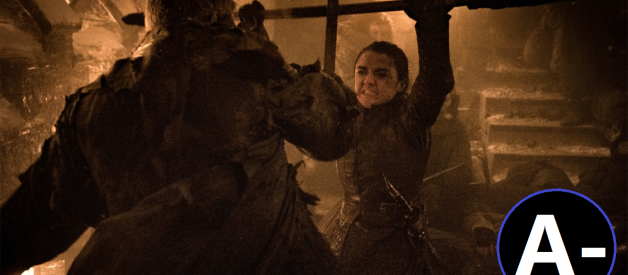It?s been a year now since Game of Thrones? aired its biggest ever battle, constructed and filmed across fifty-five consecutive night shoots.
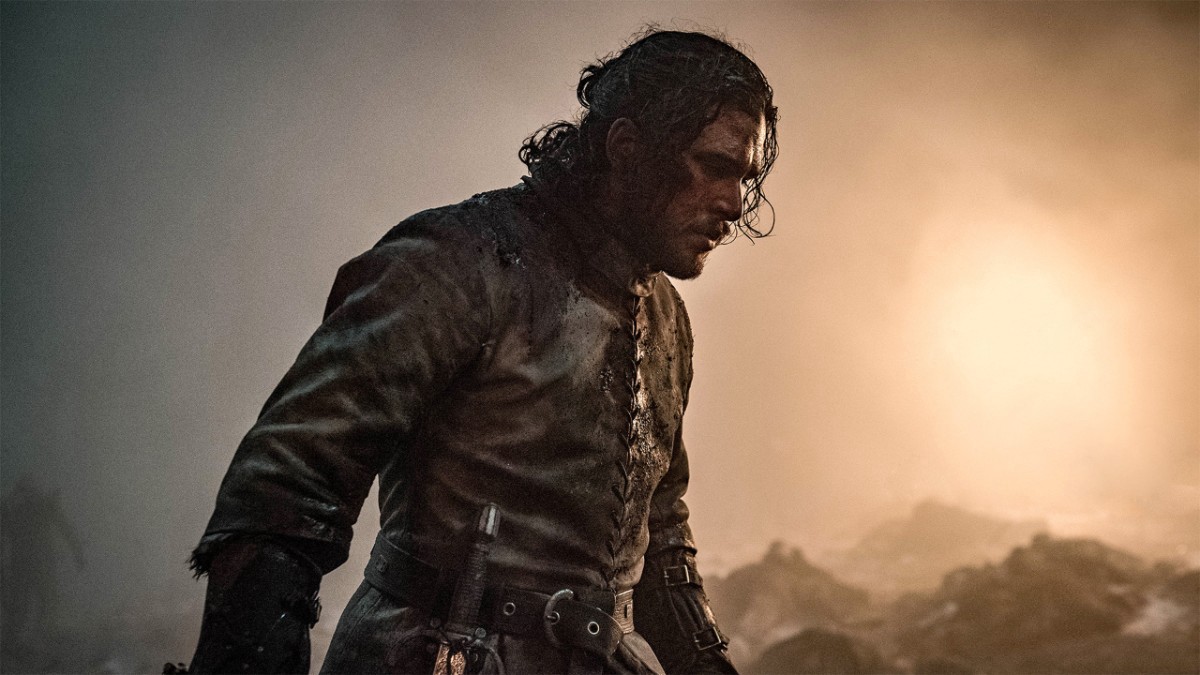 Jon Snow on the battlefield outside of Winterfell.
Jon Snow on the battlefield outside of Winterfell.
Ahead of ?The Long Night?, I was fully aware of its running time. 82 minutes, the longest episode in Game of Thrones history. Knowing the Sky Atlantic simulcast would run beyond 3.30am in the UK, I had a decision to make. Was I to fight sleep and stay awake until the sun came up, or was it best to set an alarm for 2am and get some shut-eye first? Somehow, I managed to do both and neither. I climbed into bed at 10pm and set an alarm for just as the episode began, but I couldn?t fall asleep. ?Winterfell? was a tent-pole attraction, but ?The Long Night? was the television event of 2019, and I was too excited. By then, battle episodes in Game of Thrones were the cable network drama equivalents of cup finals in spectator sports, and ?The Long Night? was going to outshine them all. Twice the size of ?Battle of the Bastards?, compared by those involved to the legendary siege of Helm?s Deep in The Lord of the Rings: The Two Towers, and billed as the night we?d been waiting for since the very first scene of the very first episode. I was on tenterhooks.
So, naturally, I accidentally fell asleep and missed my alarm, which I?d probably forgotten to set. While I dozed like a doofus, the world watched ?The Long Night? without me. The television event of 2019, an episode I?d waited years to see, and I probably snored all the way through it. What an idiot. I stirred suddenly at some unknown time???the first rays of sunlight crept into my room through the blinds, the dawn chorus tunefully accompaniedit. Dazed, I checked my phone. 5am. What?! How?! No, I hadn?t. I couldn?t have. Surely not? I?d set an alarm! For god?s sake. Without so much as blinking, I reached for the remote and found the TV recording. I hadn?t moved so quickly in months. I set my phone to ?do not disturb? (like anyone was going to contact me at that time) and hunkered down to lay witness to the carnage. When the episode faded to black around 7am and I was heading back to sleep, a springtime Monday was bursting into life outside. How appropriate.
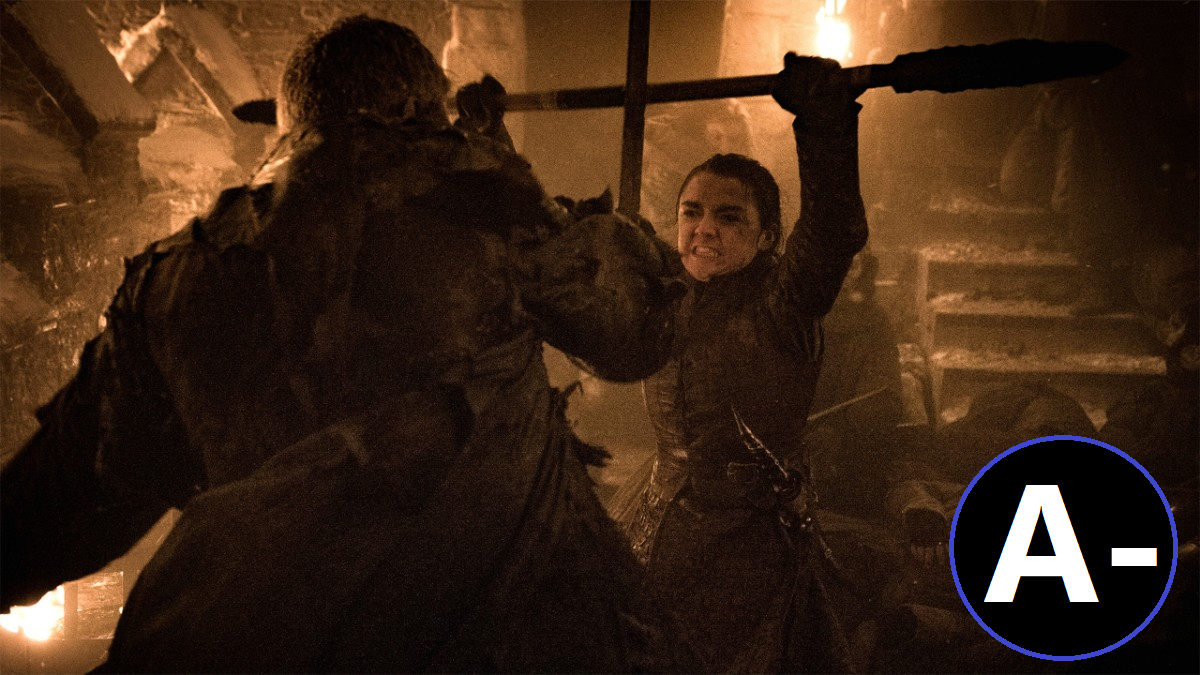 Arya Stark battles a wight.
Arya Stark battles a wight.
The Long Night (s08, e03)
Directed by: Miguel Sapochnik Written by: David Benioff & D.B. WeissOriginal broadcast: April 28th, 2019
?The Long Night? didn?t leave me feeling unsatisfied, but something didn?t feel right the next day. All I felt in the immediate aftermath was emptiness. I tried to figure out why, but I couldn?t really put my finger on it. Was it that I was hiding from disappointment that I hadn?t come to the immediate conclusion that it was absolutely astounding? Was it not enough to have only enjoyed the episode and not absolutely adored it? Did I not get the emotional rollercoaster I was expecting? I honestly couldn?t tell. I knew I?d enjoyed myself, but interpreting its various conclusions left me puzzled. And the deafening and divided reaction from fans and critics the next day briefly had me wondering if I?d actually disliked the episode, and that claiming to have appreciated the experience was a lie. Arya Stark was a feminist icon and a Mary Sue all at once; David Benioff & D.B. Weiss were simultaneously declared geniuses and pariahs; Bran Stark had been both decisive and useless during the battle; the Night King both should and shouldn?t have been the final boss. I was in too deep and feeling disillusioned, so I stepped away.
Only with time have I concluded that my emptiness after ?The Long Night? was not the fault of the episode, but the result of years-long anticipation suddenly vanishing from my life. I?d awaited the culmination of the White Walker plot for years, and suddenly I had nothing else to wait for. No more Night King or Army of the Dead, no more mysteries or predictions. It was all over. I came to realise that no resolution could have been instantly satisfying in that moment. Never mind HBO?s video compressionissues, I was unable to see through a fog of my own making. My excitement beforehand was so severe that I?d anticipated an event for the ages, but I wasn?t immediately sure if I?d witnessed one. Thankfully, returning to it a day later, then six months later, and now a year later has dispersed the mist. ?The Long Night? is a wonderful companion to ?A Knight of the Seven Kingdoms? and has already aged into a wonderful example of everything I love about television and Game of Thrones. It?s an epic spectacle that somehow finds intimacy, hope, and profound beauty under the endless smog of an unforgiving battle. It works slowly, but boy does it get there.
Make no mistake, both at the time of airing and at the point of writing, the sheer scale and ambition of the Battle of Winterfell was (and remains) unmatched on television. Just as Saving Private Ryan and the Lord of the Rings trilogy forever redefined the potential of staging battles on the big screen, ?The Long Night? will do the same for television???the technical issues during its live broadcast suggest it was possibly ahead of its time. Shot across fifty-five consecutive nights in harsh winter, and painstakingly constructed over several months at the cost of millions of dollars, this is the moment blockbuster cinema arrived on the small screen. Game of Thrones already had several battles in its back catalogue, but they?d never been this large. It should be stated, however, that director Miguel Sapochnik had no intention of sprinkling Hollywood romance or glory into this episode. It is, truth be told, an almighty slog. It trudges at near-glacial pace through its various stages to first raise the tension and then stretch it until it?s almost threadbare???this decision feels like a double-edged sword right up until the moment when the aforementioned intimacy, hope, and profound beauty shine through the smog. Then it clicks: ?The Long Night? is about the desperate search for light in an endless, all-consuming darkness.
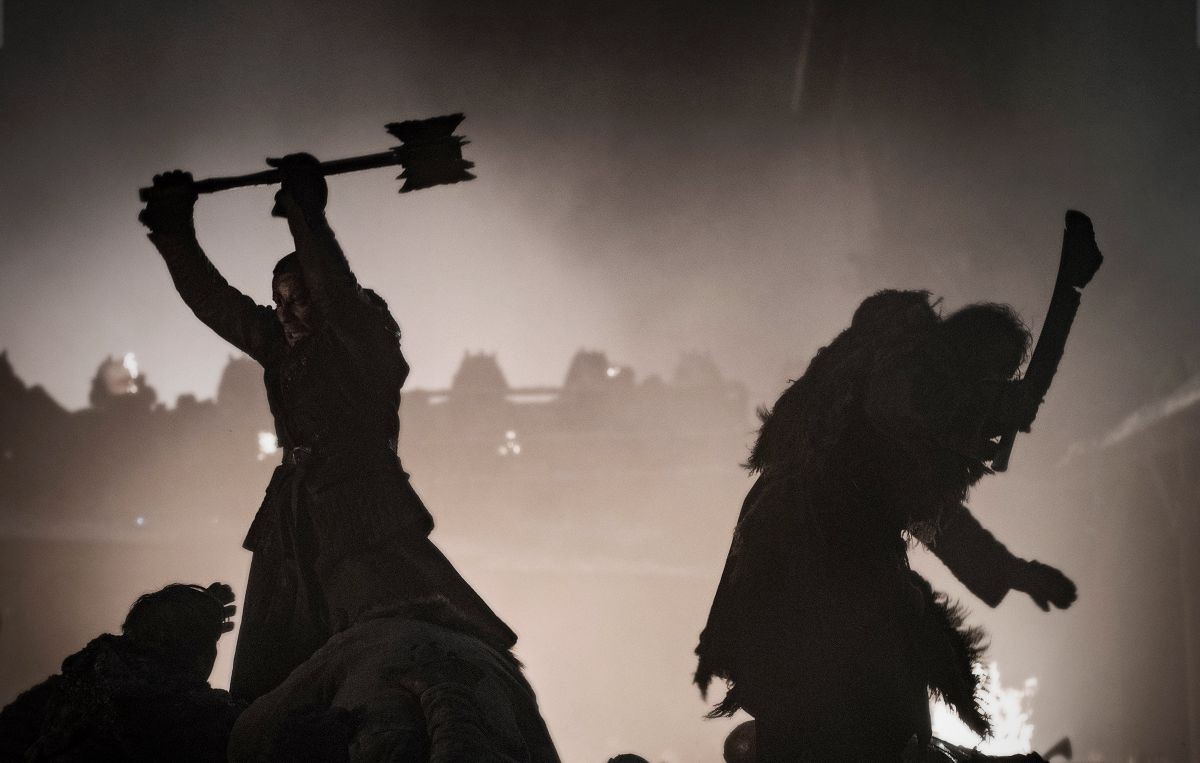 Gendry and Tormund fight against the dead.
Gendry and Tormund fight against the dead.
Where the Battle of Helm?s Deep heightened tension by having enemy torches appear on the horizon before inching ever closer to our heroes, the Battle of Winterfell does the exact opposite to achieve the same effect. After Lady Melisandre ignites the Dothraki?s arakh swords, the cavalry are sufficiently roused to charge at the enemy. For a brief moment, it?s a hopeful sequence as flaming projectiles soar gracefully over galloping horses. But then, a rider is wiped out, thousands of anguished screams echo into the night, and an unbearable stillness falls over the battlefield. One by one, the flickering lights on the horizon are all slowly extinguished. It?s a terrifying image. As it was implied during ?A Knight of the Seven Kingdoms?, there will be nothing left behind if the Army of the Dead claim victory. And once the Night King arrives, commanding his forces to once again find a way through Melisandre?s flames (this time in the form of breaching the trench), it?s clear that other options are needed to prevent that eventuality. The living have tried using light in its most primal and literal form only to achieve very little in the way of success. They need to turn to other sources to win this fight. Enter Arya Stark, the hero of Winterfell and, crucially, the light in the darkness.
I?d wondered about Arya?s significance in season 8 ever since the trailer dropped. She was the first character whose face we saw and whose voice we heard. Her declaration that she ?knew death? and was ?looking forward? to facing the Night King was effectively juxtaposed against images of her fleeing from an unspecified threat, dripping with blood, sweat, and dirt. The last time I?d seen so much raw emotion on her face was when she?d hidden Needle before joining the Faceless Men. Something had clearly shaken her. Little did I know that we?d been given the biggest clue yet that Arya was going to land the decisive blow in the Great War. A young woman, so warped by death during childhood that she worshipped it and came to know it better than herself, had finally seen its true face and realised it was much worse than she?d feared. It wasn?t something to worship, but something to defeat. There were half a dozen prime candidates to kill the Night King, but I believe now that Arya was best suited for a number of reasons. Her heroics wrap up her story beautifully and send a powerful message about personal recovery and emotional maturity, and in the process the writers dramatically declare their intentions for the season?s overall destination. This is not going to go the way you think.
At the start of the night, Melisandre inspects the episode?s eventual hero from a distance. After years of believing Stannis to be the ?prince that was promised?, before switching allegiances to a muddled combination of Jon Snow and Daenerys Targaryen, the misery and failure she?s endured as a result of clumsily interpreting vague prophecies has taken her down a painful road. The true answer to her questions, it turns out, was one she?d ignored years earlier when Arya was right under her nose. When the two meet again, after Arya dances through the Winterfell library in a tense horror sequence constructed with a surprising amount of grace and delicacy (and after she?s only able to make it out alive thanks to Beric Dondarrion?s sacrifice), Melisandre realises a significant moment has arrived. She spent so many years struggling to stay ahead in order to win the Lord of Light?s war, but has now been presented with the ultimate wildcardoutoftheblue. Earlier, the Hound had frozen in fear, chastising Beric for ever thinking that beating Death was possible. Arya (during a beautifully edited combat sequence) suddenly catches Beric?s attention as she fights with wights, inspiring him to ensure Sandor keeps fighting: ?Tell her that!? Arya fights for life where others have surrendered.
Throughout the episode, she has several encounters with Death that shake her and instigate her resurrection. Her bullish, almost robotic confidence from the previous episode is beaten down as she rediscovers emotions she?d lost the ability to feel. After sleeping with Gendry, the look in her eyes was one of a nearly lifeless being, capable of only relishing the taste of revenge. She knew Death, she knew vengeance, she knew trauma, but nothing else. Now, though, she?s experiencing fear, empathy, and hope all over again. Fear comes as her head is smashed into a wall: she lies motionless, staring into Death?s eyes, the horrific reality of what she spent years worshipping spreads across her face. Empathy comes as she softly lays a wight to rest after killing it; easily interpreted as Arya simply staying quiet, but her pained expression, on the verge of tears, suggests otherwise. And hope finally arrives in the form of Melisandre?s revelation that Beric?s purpose was to get Arya to this moment: she must be the one to close the God of Death?s ?blue eyes?. The real wonder of this episode is that an enormous set-piece still contains such profound emotional subtlety. It drags you down into the exhausting mire of battle to lift you back up with renewed optimism.
Arya springing forth to kill the Night King is an unbelievable moment of catharsis. As she flies through the air and into shot over the his shoulder, she embodies everything ?A Knight of the Seven Kingdoms? and ?The Long Night? tried to say about the connection between humanity and memory, and how humanity is allowed to learn, even from its worst mistakes. Across these two episodes she uses everything she?s been through???her memories of trauma, heartache, and pain; her memories of training as a skilled assassin; her memories of those who have mentored her and brought her to this point???to rise again as a new woman, take a giant step towards recovery, and end the Long Night for good. Not today. I didn?t pump my fist at the time because I was honestly too shocked and I hadn?t settled on any deeper conclusions, but I do now. Thinking that she didn?t deserve the kill because she didn?t have a storied, documented history associated directly with the Night King arguably ignores the deeper thematic resonance that this moment has. The Night King was written as a blank canvas so that other characters could project onto him.To us, he was an evil ice man, but to Arya he was the manifestation of Death, trauma, and everything she?s worked so hard to overcome. It?s perfect.
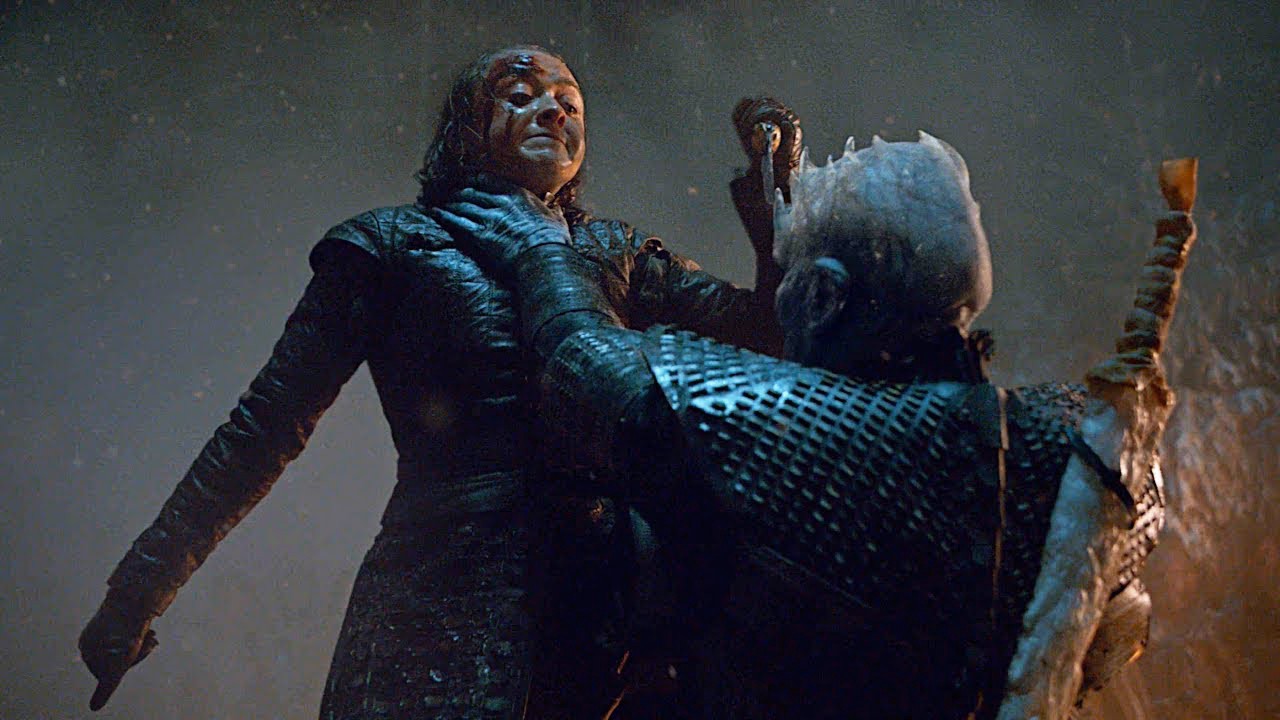 Arya Stark is held by the Night King.
Arya Stark is held by the Night King.
Another point of contention regarding Arya being the chosen one is that Jon Snow was suddenly sidelined during what many believed to be his fight. After all, he faced the White Walkers at Hardhome and on the frozen lake, he warned everybody about the coming threat; he was the ?prince that was promised?, resurrected by the Lord of Light to save the world from an endless winter; he made ally of Daenerys and convinced her to join the Northern forces for this fight. He therefore deserved the moment of glory. And, to be completely honest, that would have made sense???Jon was one of the many candidates who could have killed the Night King. The issue with this reading is that it presumes Jon to be the Aragorn of Game of Thrones, the heroic warrior and prodigal son, the secret king lying in wait to claim his rightful throne???the sort of traditional, classic hero that Game of Thrones has never written. It should be stressed that these types of heroes aren?t lazycharacters, they?re just absent in this particular show. Jon starts the battle on the sidelines and ends up so far removed from proceedings that he loses his bearings. He?s then dismissed by the Night King as he tries to fight him, and he finishes the battle completely helpless against an undead Viserion. This isn?t a sudden writing error: it was not Jon?s fight.
Ever since his death and resurrection, Jon has resented power and everything that comes with it, eschewing crowns and glory along the way. He?s been dragged through everything he?s done since, both by other people and by his sense of duty. He abdicated as Lord Commander and he bent the knee to Daenerys within weeks of being named King in the North. To keep with the Lord of the Rings comparisons, Jon is more like Frodo, a valiant and determined messenger who suffers the burden of holding the world on his weary shoulders because he believes he must. The difference between them is that Jon happens to be gifted with a sword???a talent that proves to be as much of a blessing as it is a curse. People keep following him and giving him crowns and titles when it seems likeallhewantsisalongsleep. Jon has already played his role in the fight against the dead by alerting the world to their presence and by making allies of Northmen, wildlings, and foreign armies. His ability to focus the attention of a fractured population onto one common objective cannot be understated. He is a terrific diplomat.
The decision to have Arya kill the Night King was also viewed by some fans and critics as too easy. ?An almost omniscient being with incredible strength and magic powers, felled by a teenage girl? How contrived.? Well, putting aside the aforementioned ramifications for Arya?s story (and putting aside the fact that she?s a trained assassin with specific skills relating to stealth and flexibility), the Night King?s defeat also represents a turning point in the final season. It may prematurely resolve a conflict that had been brewing since the first episode, but it does so deliberately to leave the story hanging on the enticing cliffhanger of whether the living will learn from this victory. In order words, Arya has given the human race a chance to hit the reset button and reassess their priorities. It?s all over the episode ?wildlings fight with Northmen; Jaime stands beside men who would ordinarily want him murdered; Theon defends a castle he once invaded; Davos parks his personal grievance with Melisandre; those stationed in the crypts abandon their ?divided loyalties? when the dead come to life and begin attacking them; armies and generals from across two continents band together to fight a common threat. Now the battle is won and they?ve been left to their own devices, can humans learn from their centuries of mistakes and enable an overdue healing process?
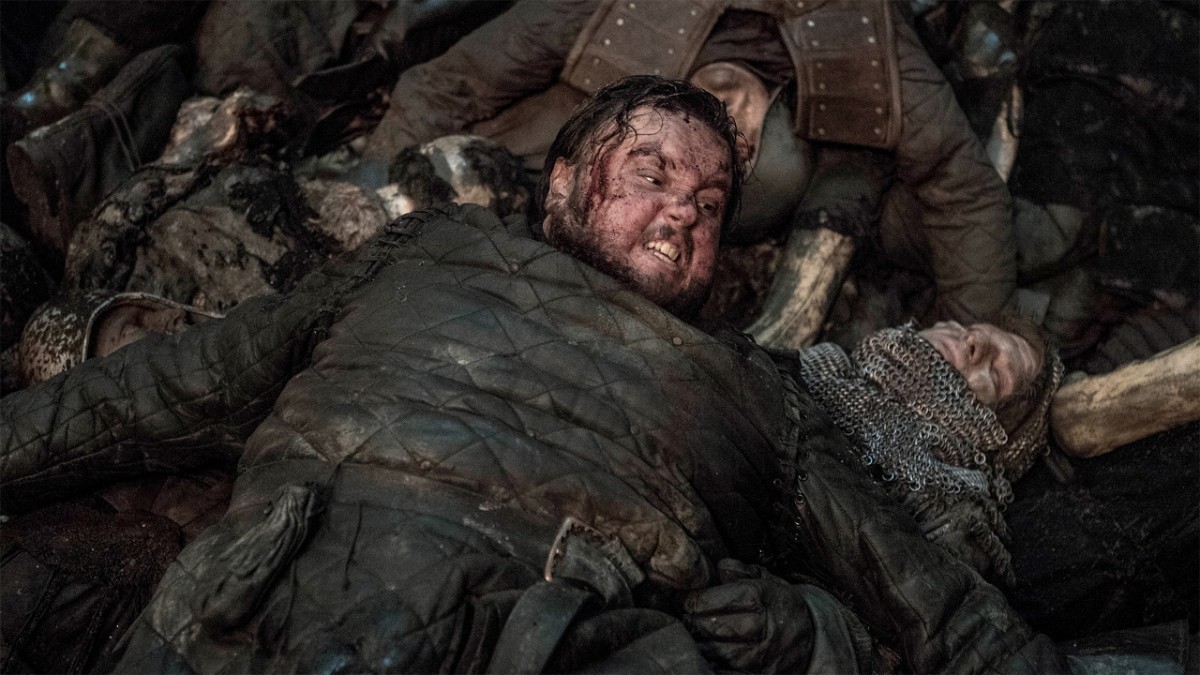 Sam Tarly tries to get back to his feet.
Sam Tarly tries to get back to his feet.
The unbridled misery of this battle is somewhat undermined by the low death count. When staging something like this, dragging the audience into a hopeless situation, is it not better to compound their misery and kick them while they?re down? Maybe I?m just ruthless. There are numerous occasions where we leave characters in seemingly inescapable situations, only for them to be fighting fit again in the very next scene. It does work against the otherwise effective tension. With that said, every death is played beautifully, as tragedy, bravery, and heroism permeate them all. Edd saves Sam from a grisly fate before he?s caught off guard; Lyanna Mormont brings down a giant before being crushed; Jorah dies defending his queen; Beric sacrifices himself to save Arya; Melisandre gracefully disintegrates in the snow and is blown away on the wind. It?s Theon Greyjoy, though, who gets the biggest send-off after stretching every sinew to defend Bran, who offers his blessing to the man who once stole his home from him. The words seem to complete Theon?s difficult journey to recovery???he has needed to hear these words for some time. Knowing that he?s a ?good man?, he at last feels redemption and completes his strenuous journey to recovery before the end. It?s an incredibly emotional farewell to one of the show?s most complex and well-defined characters.
The episode ends on a particularly sobering note that, in hindsight, has come to signify an important event in Westeros? history: magic is starting to leave the continent once again. Everything that was myth or legend during the days of King Robert?s rule slowly came to life and eventually dominated the focus of the show. Dragons were born and eventually won battles, red priests and priestesses resurrected people, the Night King assembled his armies and breached the Wall, Bran became the Three-Eyed-Raven. But the list of fantastical beings and legendary incidents built over the course of the show is now beginning to dwindle. The Lord of Light?s war has been won, his last remaining follower has passed away, the Night King and the Army of the Dead are gone, and there are only two dragons remaining. Soon enough, there will be no dragons in Westeros and no answers to the great prophecies???just a Three-Eyed-Raven ruling the land exclusively with human help. The Night King?s death istheforkintheroad, providing humanity with a chance to prove that, when left todecidetheirownfate, they can heal and learn to treat each other with fairness. They have so much potential, but what will they do with it?
It?s taken an entire calendar year and a fourth (or possibly fifth) re-watch to figure all of this out for myself, which is all the proof I need to realise that first impressions of event entertainment aren?t worth that much. I?m not sure if any serious Game of Thrones fan went into this episode with a clear head, so I?m puzzled as to why I expected to settle my feelings about the episode a day after it aired. Much like Arya?s journey through the Battle of Winterfell, I thought I was detached from the emotional connection I expected from ?The Long Night?, but it turns out all I had to do was rediscover them to get a clear view. As I said in the first edition of this series, time is the best cure for controversy, and it was simply a matter of time for me to understand this episode. If I hadn?t taken the time to reconsider my feelings, or if I hadn?t thought about doing this blog series, then I may never have understood or appreciated ?The Long Night? on the level that I currently do. It?s more than okay to change opinions after the fact, especially when it comes to landmark episodes and films. For as long as art exists, it will be made to be discovered and rediscovered all over again. There?s always a chance for change.
Grading
Story: ADelivery: B+Overall: A-
Stray observations
? The illusion of a single take in the opening sequence, before the battle even begins, creates an excellent little puzzle. You open on Sam, transition to Tyrion, then to Bran. You see Arya and Sansa in the distance of a shot that?s focusing on Davos, only for them to be the featured characters in the next frame. It?s cleverly constructed and nicely edited, and the silence they all share makes the occasion even more tense.
? I?m not sure what Bran does in the battle really, but I?m not sure that?s a problem. He?s a complete pacifist now, more of an objective observer. He?s there to watch over the Night King?s arrival, and then I presume he observes the rest of the battle, allowing events to play out. I don?t think he can see the future and control it, but I think he has a vague idea of it. It?s similar to Alice in the Twilight saga, who can see the future, but only of the current path being taken. If the path changes, so too does the destination.
? There?s another excellent single-take sequence during the battle as Jon tries desperately to reach the godswood in time. During the sequence he leaves Sam behind (presumably to die) because he has no other option, he gets trapped behind a gate containing a group of wights, and realises he?s done for when Viserion corners him. It?s easy to forget that, across this sequence?s duration, as Ramin Djawadi?s wonderful ?The Night King? plays in the soundtrack, the living technically lose the battle. The wights swarm Winterfell, Viserion is vomiting up blue flame and ransacking the place, and the Night King is inches from victory. But for Arya, the living would have lost.
? Like all villains, the Night King is felled by his hubris. He (and his White Walker generals) are so focused on the Three-Eyed-Raven that he misses Arya coming to kill him. It mirrors an excellent scene from the third season as Jojen and Meera are introduced to the show. Osha corners Jojen, who is unarmed, and remarks that being unarmed was ?poor planning?. At that moment, it?s revealed that Meera has been holding Osha at knife point the entire time. Jojen simply says, ?My sister carries the weapon.? It provides beautiful symmetry too, as the Night King is stabbed through the heart under a godswood tree ? just as he was created.
? Down in the crypt, political tensions do briefly get a glance. Missandei rightly points out that the living would be absolutely screwed without Daenerys? forces, and that Sansa should watch her tongue when it comes to discussing divided loyalties. Tyrion and Sansa share a delicate moment later as the dead run amok in the crypts that arguably seals their trust. But more on that later. Also, I?m not sure if I fully subscribe to the idea that putting Varys, Gilly, etc. in the crypts was poor writing. There?s a difference between somewhere being ?the safest possible place? and actually being a safe place, and I?m not sure if the majority made that connection. It?s like being asked to hide in behind mattresses during a nuclear attack ? it won?t exactly be safe, but it might stop you from being instantly vaporised.
? Daenerys immediately changes her plans when she watches her Dothraki forces lose significant numbers early on. She?s still got her eye on being able to use them in the aftermath.
